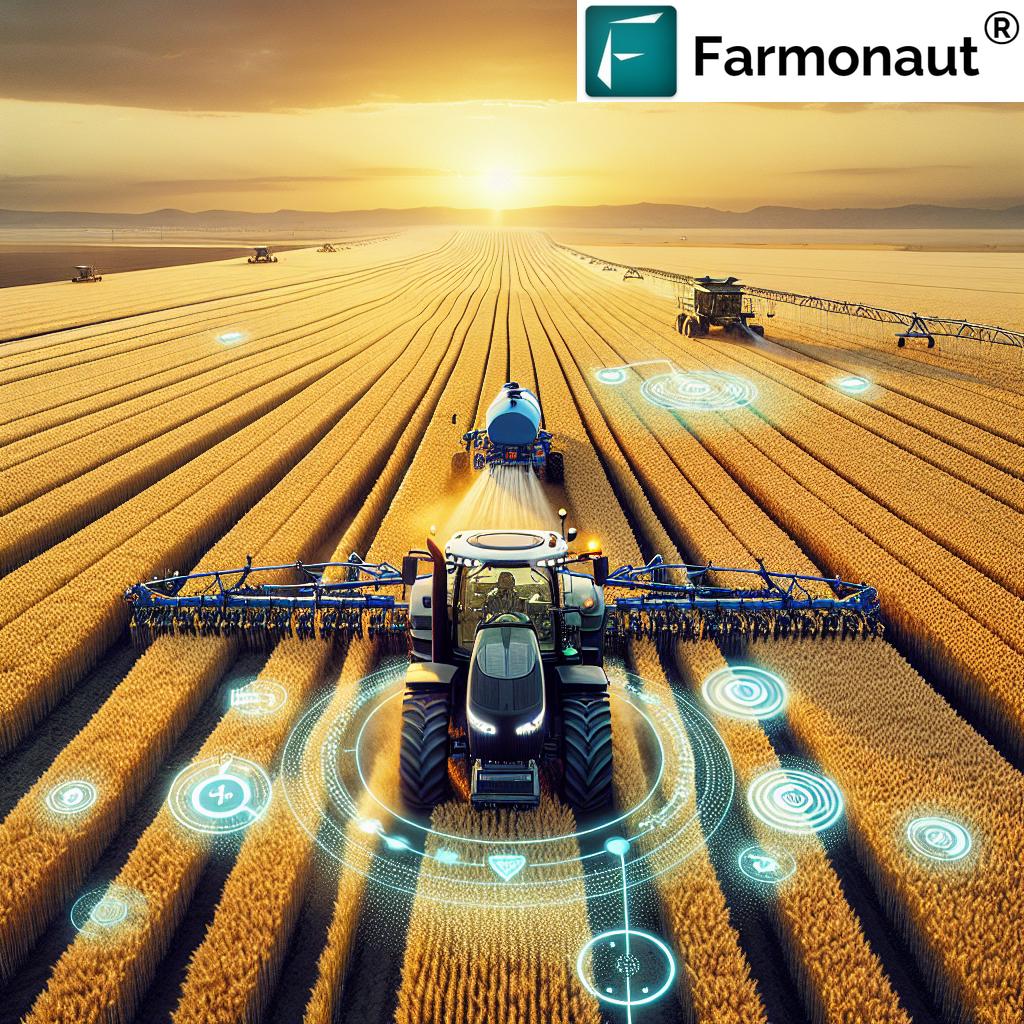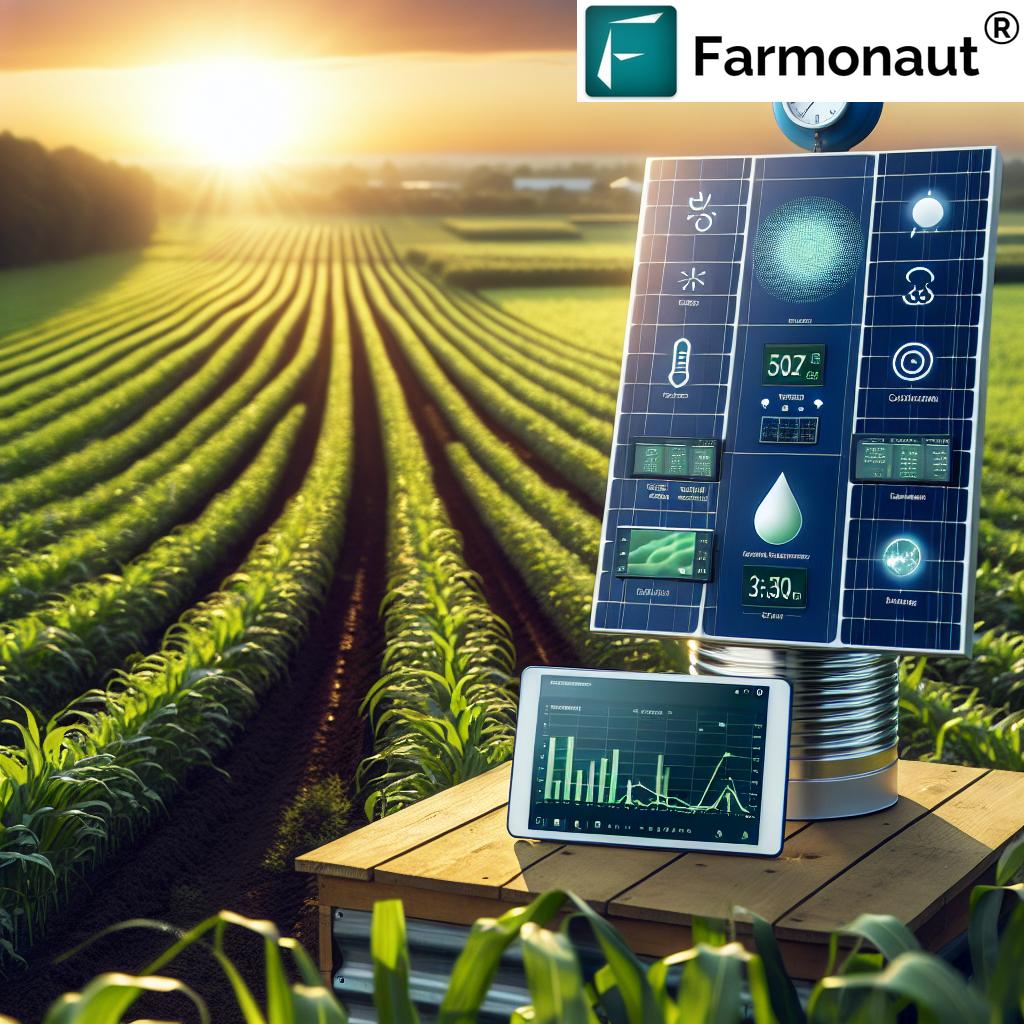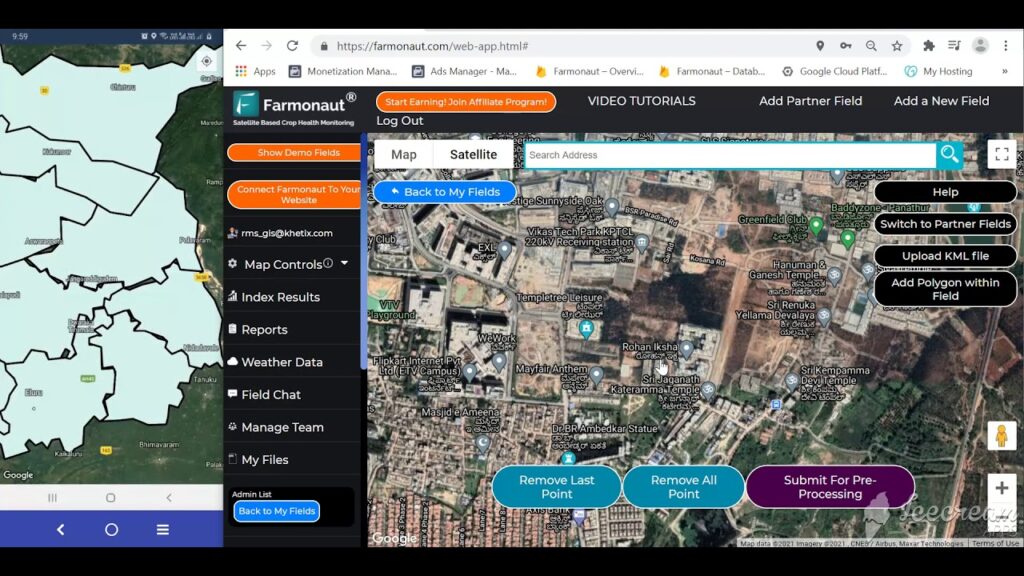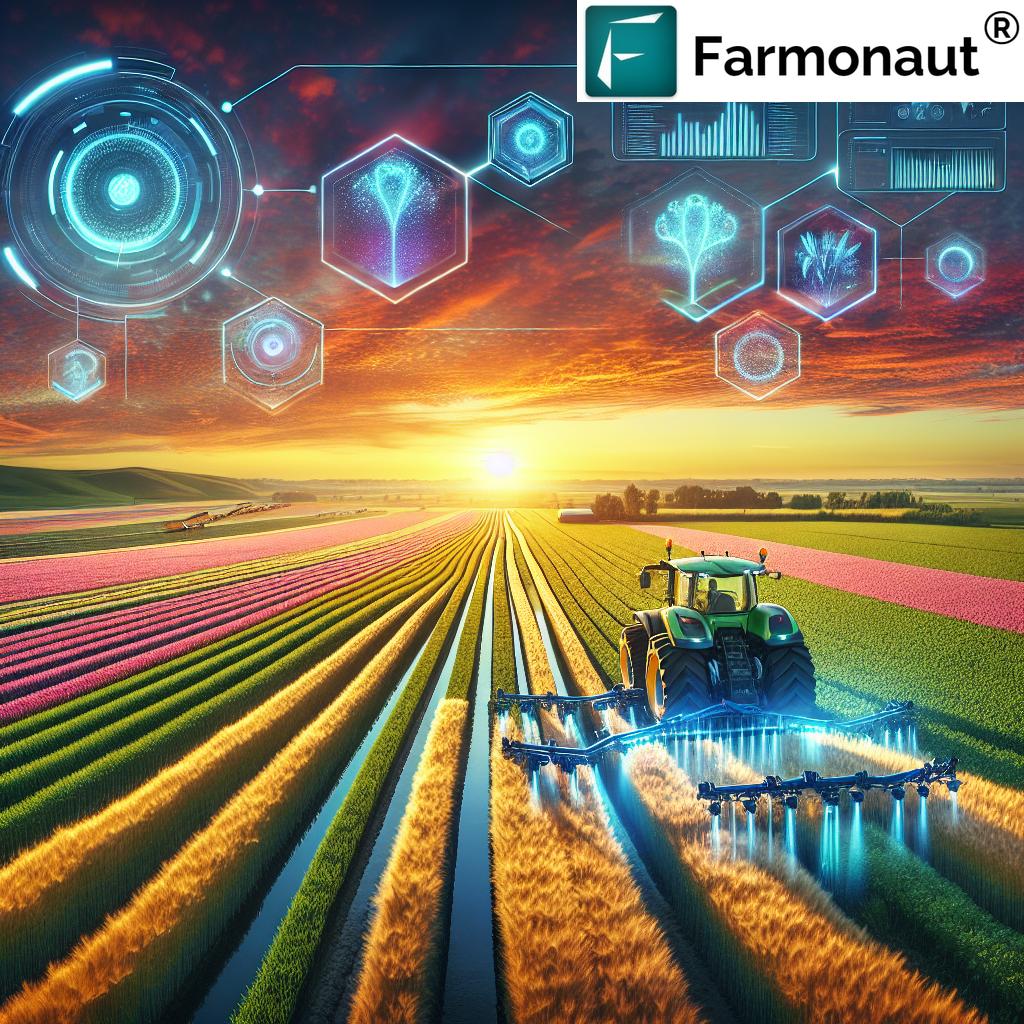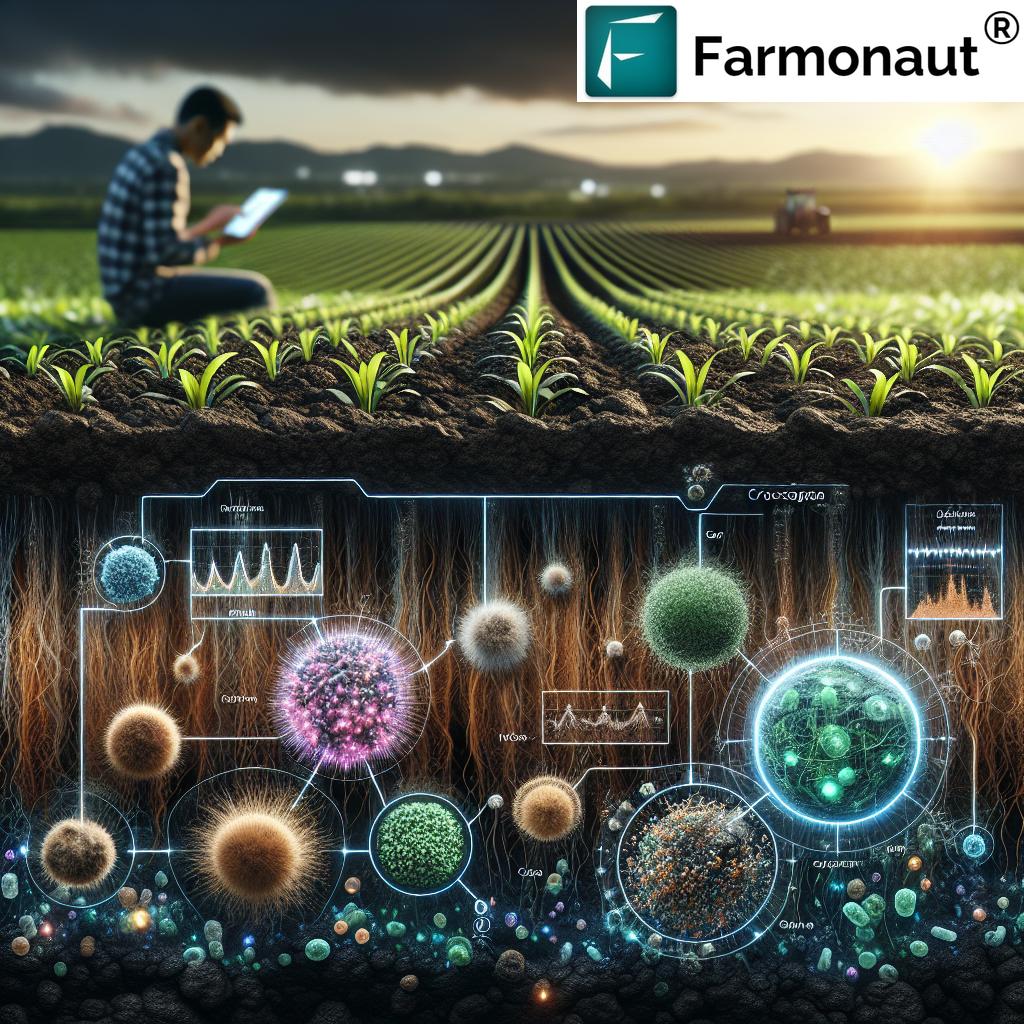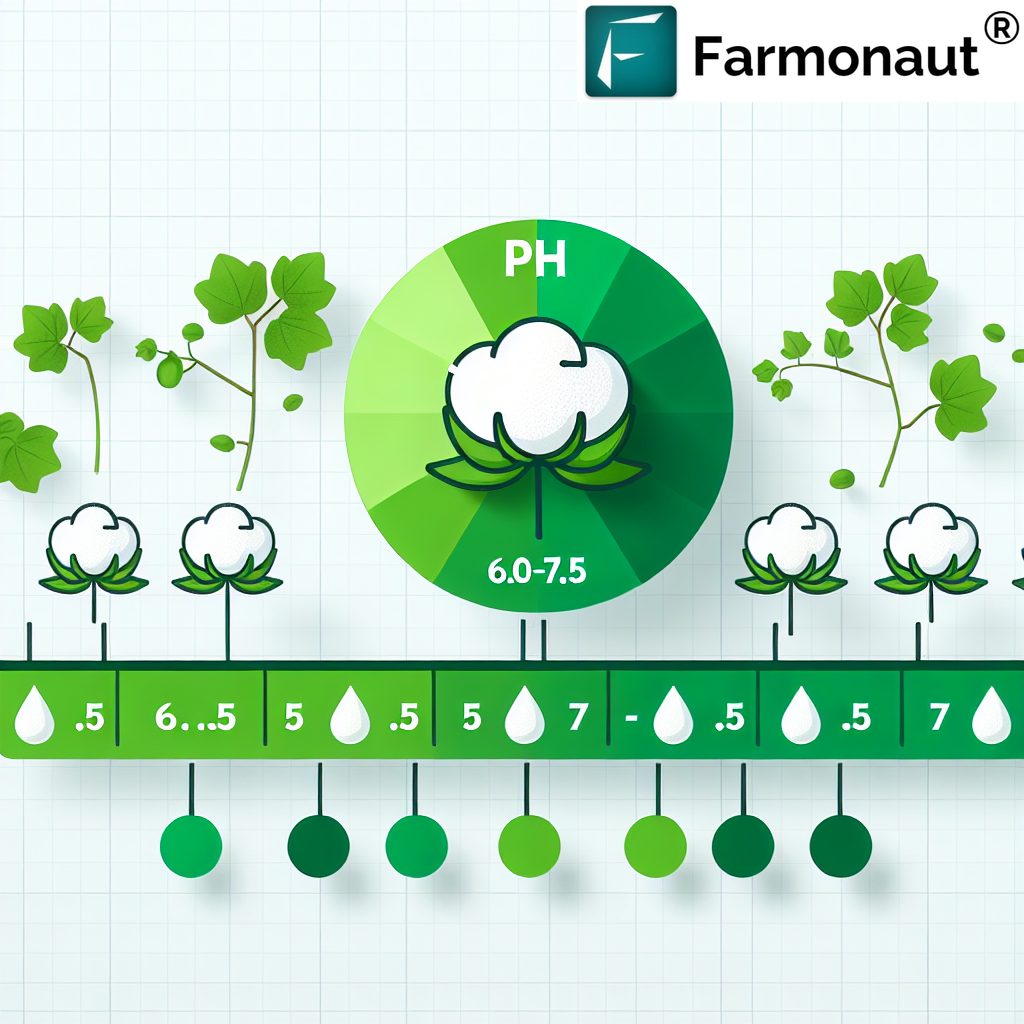Mastering Precision Farming: Farmonaut’s Guide to Agricultural Data Analytics and Farm Business Optimization

Welcome to our comprehensive guide on mastering precision farming through the lens of agricultural data analytics and farm business optimization. In this blog post, we’ll explore the fascinating world of modern agriculture, focusing on how innovative technologies and educational initiatives are shaping the future of farming. We’ll dive deep into the critical role of written tests in dairy farm management and agricultural education programs, drawing parallels with the cutting-edge solutions offered by Farmonaut.
“National dairy bowl contests integrate individual exam scores with live competition points, creating a unique 100-point scoring system.”
As we embark on this journey, it’s crucial to understand that the agricultural landscape is rapidly evolving. The integration of technology, data-driven decision-making, and educational programs is revolutionizing how we approach farming. Let’s begin by examining the intersection of traditional agricultural knowledge and modern precision farming techniques.
The Evolution of Agricultural Education: From Classrooms to Fields
Agricultural education has come a long way from simple classroom lectures to hands-on experiences that mirror real-world farming challenges. One prime example of this evolution is the national dairy bowl contest, which combines academic knowledge with practical application through its unique exam component.
- Short-answer questions test individual knowledge
- Team collaboration exercises mirror real-world problem-solving
- Timed sections simulate the pressure of making quick decisions on the farm
These educational formats are not just academic exercises; they’re designed to prepare the next generation of farmers for the complexities of modern agriculture. The skills honed through these contests directly translate to the field, where precision farming techniques require a blend of theoretical knowledge and practical application.
The Critical Role of Written Tests in Dairy Farm Management
Written tests in agricultural education programs serve a dual purpose. They not only assess a student’s grasp of fundamental concepts but also prepare them for the data-driven world of modern farming. Let’s break down the key components of these exams and their relevance to precision farming:
- Individual Knowledge Assessment: Short-answer questions evaluate understanding of crucial topics like animal care, nutrition, and milk quality.
- Team Collaboration: Group exercises mimic the collaborative nature of farm management, where multiple stakeholders often need to work together to solve complex problems.
- Time Management: Timed sections of the exam reflect the need for quick, informed decision-making in real farm scenarios.
- Analytical Thinking: Questions often require students to analyze data and draw conclusions, much like interpreting crop health data in precision farming.
These components collectively contribute to a comprehensive evaluation of a student’s readiness for the challenges of modern dairy farming. The unique scoring system, which integrates individual exam scores with live competition points, adds an element of unpredictability that keeps contestants on their toes – much like the ever-changing conditions farmers face in the field.
Bridging the Gap: How Educational Contests Mirror Precision Farming Techniques
The structure of agricultural education programs, particularly contests like the national dairy bowl, closely aligns with the principles of precision farming. Let’s explore how these educational initiatives reflect real-world farming practices:
- Data Interpretation: Just as contestants analyze information to answer questions, farmers use data from satellite imagery and sensors to make informed decisions.
- Collaborative Problem-Solving: Team-based exercises in contests mirror the collaborative nature of modern farm management, where various experts often work together.
- Rapid Decision-Making: Timed sections in exams simulate the need for quick, accurate decisions in farming, especially when dealing with time-sensitive issues like crop diseases or weather changes.
- Multidisciplinary Knowledge: Contests cover a wide range of topics, reflecting the diverse skill set required in precision farming, from crop science to data analytics.
This alignment between educational formats and real-world farming practices is not coincidental. It’s a deliberate effort to prepare students for the complexities of modern agriculture, where technology and traditional farming knowledge intersect.
At Farmonaut, we recognize the importance of this intersection. Our platform is designed to seamlessly integrate advanced technology with practical farming knowledge, making precision agriculture accessible to farmers of all scales. By leveraging satellite imagery, AI, and machine learning, we provide tools that complement the skills developed through agricultural education programs.
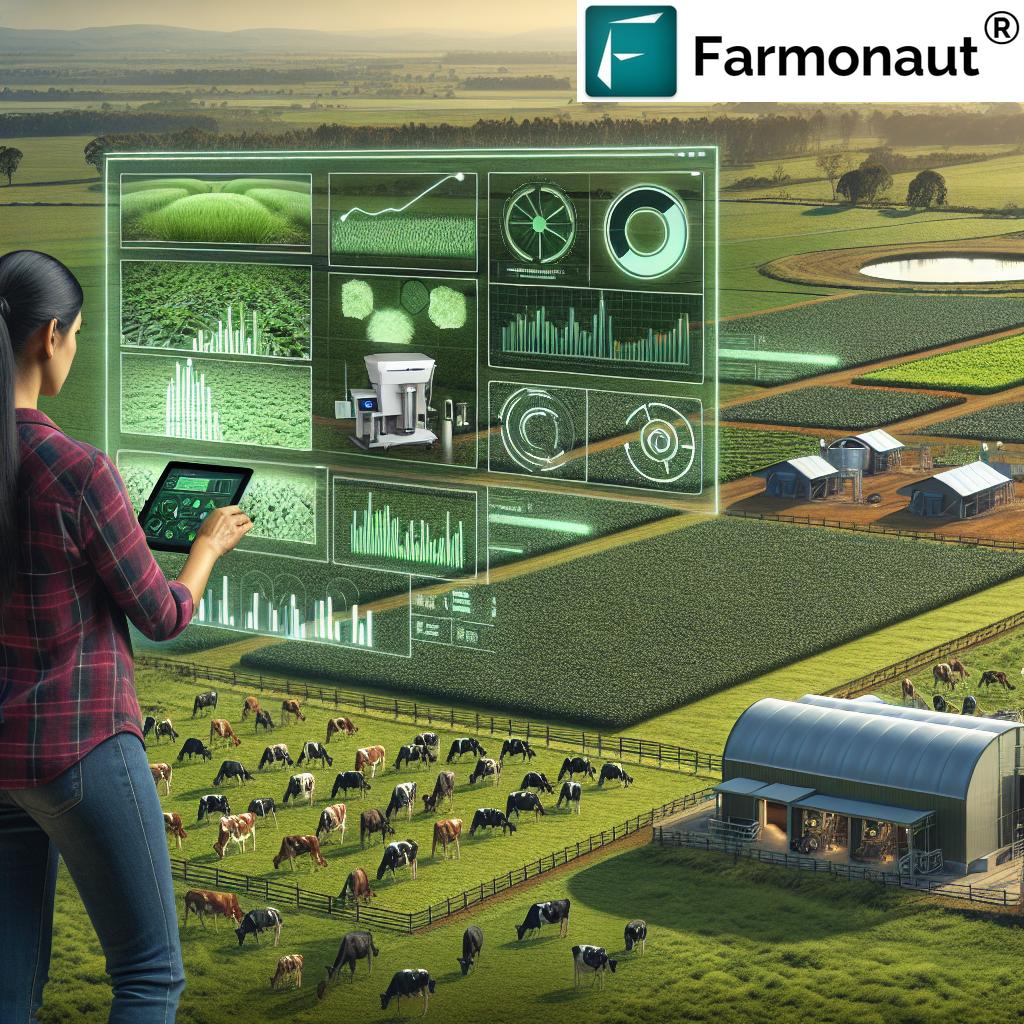
The Power of Agricultural Data Analytics in Farm Business Optimization
As we delve deeper into the world of precision farming, it’s crucial to understand the role of agricultural data analytics in optimizing farm businesses. This is where the theoretical knowledge gained through educational programs meets the practical application of technology in the field.
“Written tests in dairy farm management programs often include both short-answer questions and collaborative team responses, mirroring precision farming techniques.”
Agricultural data analytics involves collecting, processing, and analyzing vast amounts of data to make informed decisions about farm management. This data can come from various sources, including:
- Satellite imagery
- Weather stations
- Soil sensors
- Crop yield monitors
- Livestock tracking devices
By harnessing this data, farmers can optimize various aspects of their operations, including:
- Crop Management: Analyzing soil health, moisture levels, and crop growth patterns to make informed decisions about planting, irrigation, and harvesting.
- Resource Allocation: Efficiently distributing water, fertilizers, and pesticides based on precise needs, reducing waste and environmental impact.
- Yield Prediction: Using historical data and current conditions to forecast crop yields, helping with financial planning and market strategies.
- Risk Management: Identifying potential issues early, such as pest infestations or disease outbreaks, allowing for proactive measures.
Farmonaut’s platform is at the forefront of this data-driven revolution in agriculture. Our satellite-based crop health monitoring system provides real-time insights into vegetation health, soil moisture levels, and other critical metrics. This allows farmers to make informed decisions about irrigation, fertilizer usage, and pest management, ultimately optimizing crop yields and reducing resource wastage.
To experience the power of Farmonaut’s agricultural data analytics firsthand, visit our web application:
Sustainable Agriculture Practices: The Role of Technology and Education
As we continue to explore the intersection of agricultural education and precision farming, it’s essential to highlight the role of sustainable agriculture practices. These practices are not only crucial for environmental conservation but also for the long-term viability of farming businesses.
Sustainable agriculture aims to meet society’s food and textile needs in the present without compromising the ability of future generations to meet their own needs. It integrates three main objectives:
- Environmental health
- Economic profitability
- Social and economic equity
Educational programs and contests like the national dairy bowl are increasingly incorporating sustainability concepts into their curricula. This ensures that the next generation of farmers is well-equipped to implement eco-friendly practices in their operations.
At Farmonaut, we’re committed to promoting sustainable agriculture through our innovative technologies. Our platform offers several features that support environmentally conscious farming:
- Precision Resource Management: By providing accurate data on crop health and soil conditions, we help farmers optimize their use of water, fertilizers, and pesticides, reducing waste and environmental impact.
- Carbon Footprint Tracking: Our carbon footprinting feature allows agribusinesses to monitor their emissions in real-time, enabling them to take steps towards reducing their environmental impact.
- AI-Driven Advisories: Our Jeevn AI system provides personalized recommendations for crop management, taking into account sustainable practices and local environmental conditions.
The Impact of Written Tests on Team Dynamics and Performance
Returning to our discussion on agricultural education programs, it’s fascinating to examine how the written test component influences team dynamics and overall performance in contests like the national dairy bowl. This aspect of the competition offers valuable insights that translate directly to farm management and precision farming techniques.
Key impacts of written tests on team dynamics include:
- Individual Accountability: Each team member’s performance on the written test contributes to the overall score, encouraging personal responsibility and thorough preparation.
- Knowledge Sharing: Team members often study together, sharing their expertise and learning from each other’s strengths.
- Stress Management: The pressure of the written test helps contestants develop coping mechanisms for high-stress situations, a valuable skill in farm management.
- Holistic Understanding: The comprehensive nature of the test ensures that team members have a well-rounded knowledge base, mirroring the diverse skill set required in modern farming.
These dynamics closely reflect the collaborative nature of modern farm management, where different specialists must work together to optimize operations. In precision farming, for instance, agronomists, data analysts, and farm managers must collaborate effectively to interpret data and implement strategies.
Farmonaut’s platform is designed with this collaborative approach in mind. Our tools facilitate seamless information sharing and decision-making among different stakeholders in the farming process. Whether you’re accessing our services via our web application, mobile apps, or API, we ensure that critical agricultural data is easily accessible and interpretable for all team members.
For developers looking to integrate Farmonaut’s powerful agricultural data into their own systems, check out our API documentation:
Crop Nutrient Management: From Theory to Practice
One of the most critical aspects of precision farming is crop nutrient management. This field beautifully illustrates the transition from theoretical knowledge, as tested in educational programs, to practical application in the field. Let’s explore how this transition occurs and how Farmonaut’s tools support effective nutrient management.
- Theoretical Foundation: Agricultural education programs cover topics like soil science, plant nutrition, and fertilizer chemistry. Written tests assess students’ understanding of these fundamental concepts.
- Data Collection: In real-world farming, nutrient management begins with data collection. This includes soil testing, plant tissue analysis, and historical yield data.
- Analysis and Interpretation: Farmers and agronomists analyze this data to determine the nutrient needs of their crops. This step requires the analytical skills often tested in educational contests.
- Prescription Development: Based on the analysis, a nutrient management plan or prescription is developed. This plan specifies the types, amounts, timing, and method of nutrient application.
- Implementation and Monitoring: The plan is put into action, and the results are closely monitored throughout the growing season.
Farmonaut’s platform plays a crucial role in this process by providing real-time data on crop health and soil conditions. Our satellite-based monitoring system allows farmers to track the effectiveness of their nutrient management strategies and make timely adjustments as needed.
The Future of Agricultural Education and Precision Farming
As we look to the future, it’s clear that the integration of technology and education in agriculture will only deepen. The skills tested in programs like the national dairy bowl contest will continue to evolve, reflecting the changing needs of the agricultural industry. Here are some trends we anticipate:
- Increased Focus on Data Literacy: Future agricultural education programs will likely place greater emphasis on data analysis and interpretation skills.
- Virtual and Augmented Reality Training: These technologies could be incorporated into educational contests, allowing participants to engage with simulated farm environments.
- Integration of AI and Machine Learning: Understanding how these technologies can be applied in farming will become an essential part of agricultural education.
- Emphasis on Sustainability: As environmental concerns grow, sustainable farming practices will take center stage in both education and practical application.
At Farmonaut, we’re committed to staying at the forefront of these developments. Our platform continuously evolves to incorporate the latest advancements in agricultural technology, ensuring that farmers have access to cutting-edge tools for precision farming.
Experience the future of farming with Farmonaut’s mobile apps:
Comparative Analysis: Written Test Components and Precision Farming Techniques
To further illustrate the connection between agricultural education programs and modern farming practices, let’s examine a comparative analysis of written test components and their relevance to precision farming:
| Test Component | Skills Tested | Scoring Weight | Relevance to Precision Farming | Farmonaut Tool Application |
|---|---|---|---|---|
| Short Answer Questions | Individual Knowledge | 30% | High | Crop Monitoring, Yield Prediction |
| Team Collaboration | Teamwork, Problem-Solving | 25% | High | Farm Management, Decision Support |
| Data Interpretation | Analytical Skills | 20% | High | Agricultural Data Analytics |
| Timed Sections | Quick Decision-Making | 15% | Medium | Real-time Monitoring, Alerts |
| Sustainability Questions | Environmental Awareness | 10% | High | Carbon Footprint Tracking |
This table clearly demonstrates how the skills tested in agricultural education programs directly translate to the competencies required in precision farming. It also highlights how Farmonaut’s tools align with these skills, providing practical applications for the knowledge gained through educational initiatives.
Empowering Farmers with Accessible Technology
One of the most significant challenges in modern agriculture is making advanced farming technologies accessible to farmers of all scales. This is where Farmonaut’s mission aligns perfectly with the goals of agricultural education programs. We believe that precision farming should not be limited to large-scale operations with substantial resources.
Our platform is designed to be:
- User-Friendly: Intuitive interfaces make our tools accessible even to those with limited technical expertise.
- Scalable: Whether you’re managing a small family farm or a large agricultural enterprise, our solutions can be tailored to your needs.
- Cost-Effective: By leveraging satellite technology, we eliminate the need for expensive on-ground sensors, making precision farming more affordable.
- Comprehensive: From crop monitoring to fleet management, we offer a wide range of tools to address various aspects of farm management.
By democratizing access to advanced agricultural technologies, we’re helping to bridge the gap between agricultural education and real-world farming practices. This ensures that the knowledge gained through programs like the national dairy bowl can be practically applied, regardless of the size or resources of the farm.
Conclusion: The Synergy of Education and Technology in Modern Agriculture
As we’ve explored throughout this blog post, the worlds of agricultural education and precision farming are increasingly intertwined. The skills and knowledge tested in programs like the national dairy bowl contest directly translate to the competencies required in modern farm management. Simultaneously, technological advancements in agriculture are shaping the future of these educational initiatives.
At Farmonaut, we’re proud to be at the intersection of these two worlds. Our platform not only provides farmers with cutting-edge tools for precision agriculture but also supports the practical application of knowledge gained through agricultural education programs. By making advanced farming technologies accessible and user-friendly, we’re contributing to the ongoing evolution of the agricultural industry.
As we look to the future, the synergy between education and technology in agriculture will only grow stronger. The farmers of tomorrow will need to be as comfortable with data analytics and satellite imagery as they are with traditional farming practices. By fostering this integration, we can ensure a more sustainable, efficient, and productive future for agriculture worldwide.
Ready to experience the future of farming? Explore Farmonaut’s solutions today:
Farmonaut Subscriptions
Frequently Asked Questions
Q: How does Farmonaut’s technology complement agricultural education programs?
A: Farmonaut’s platform provides practical applications for the theoretical knowledge gained in agricultural education programs. Our tools allow students and farmers to apply concepts like data analysis, crop health monitoring, and resource management in real-world scenarios.
Q: Can small-scale farmers benefit from Farmonaut’s precision farming tools?
A: Absolutely! Farmonaut’s solutions are designed to be scalable and cost-effective, making precision farming accessible to farmers of all scales. Our satellite-based monitoring system eliminates the need for expensive on-ground sensors, allowing even small-scale farmers to leverage advanced agricultural technologies.
Q: How does Farmonaut contribute to sustainable agriculture practices?
A: Farmonaut promotes sustainability through features like precise resource management, which helps reduce waste of water and fertilizers. Our carbon footprint tracking tool also allows farmers to monitor and reduce their environmental impact. Additionally, our AI-driven advisories take into account sustainable practices when providing recommendations.
Q: How often is Farmonaut’s satellite data updated?
A: The frequency of satellite data updates depends on the specific subscription plan. However, we strive to provide regular updates to ensure farmers have access to timely and relevant information about their crops and fields.
Q: Does Farmonaut offer training or support for users new to precision farming technologies?
A: Yes, we provide comprehensive support and resources to help users get the most out of our platform. This includes user guides, video tutorials, and customer support to assist with any questions or issues.









